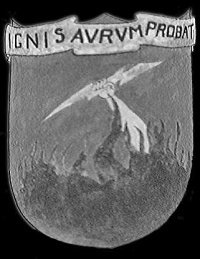416th Bombardment Group: Difference between revisions
| Line 24: | Line 24: | ||
==Commanders (with date of appointment)== | ==Commanders (with date of appointment)== | ||
LtCol Richard D Dick: Feb 1943 | LtCol Richard D Dick: Feb 1943<br/> | ||
Col Harold L Mace: Oct 1943 | Col Harold L Mace: Oct 1943<br/> | ||
Col Theodore R Aylesworth: 3 Aug 1944- 1945 | Col Theodore R Aylesworth: 3 Aug 1944- 1945<br/> | ||
==Main Bases== | ==Main Bases== | ||
Revision as of 20:35, 17 March 2018
| 416th Bombardment Group | |||
|---|---|---|---|
| Air Force: 9th Air Force | |||
| Division: 9th Bomb. Division (Medium) | |||
| Wing: 97th Bomb. Wing (1944-1945) | |||
| Active: 1943-1945 | |||
| Theater Europe | |||
| Motto: Ignus Aurum Probat (Fire Tests Gold) | |||
History
The 416th Bombardment Group was a light bomber unit that fought with the Ninth Air Force, taking part in the D-Day campaign and the fighting in France, the Low Countries and Germany.
The group was activated in February 1943 and trained with the A-20 Havoc. It took that aircraft to England in January-February 1944 and joined the Ninth Air Force, the American contribution to the tactical air force being gathered to support the invasion of Europe. By 1944 the A-20 was being used as a level bomber, with formations of solid nosed B-20Gs and B-20Hs, being led by the clear nosed A-20Js and A-20Ks.
The group entered combat in March 1944. Most of its early missions were attacks on V-Weapon sites, with a number of attacks on airfields and coastal defenses thrown in. In June 1944 the group hit transport links, including bridges, marshalling yards and road junctions. In July 1944 it took part in the fighting at Caen and assisted with the breakthrough at St. Lo, and in August-September 1944 it took part in the siege of the German garrison at Brest.
Between 6-9 August 1944 the group attacked bridges, railways, rolling stock and a radar station during the campaign to block the Falaise gap. It was awarded a Distinguished Unit Citation for these missions.
In September 1944 the 416th supported Operation Market-Garden. After that it was used to attack transport links and supply dumps that were being used to support the Siegfried line.
In November 1944 the group began swapping its A-20s for the new A-26 Invader. It flew its first combat mission using A-26 Invaders on 17 NOV 1944, during Mission #159 - a nighttime raid on a supply depot in Hageunau, France. They flew a mixed group of A-20 Havocs alongside A-26 Invaders. Initially, all four squadrons of the 416th flew mixed aircraft.
It was back in action in time to take part in the Battle of the Bulge, where it was used to attack German troops and strong points as well as the transport links to the battlefield.
During 1945 it was used to support the Allied advance into Germany, attacking the same sort of targets. It was also used to attack German anti-aircraft defenses during the crossing of the Rhine in July-October 1945. The group returned to the US between July and October 1945 and was inactivated on 24 October 1945.
Aircraft
Feb 1943-Nov 1944: Douglas A-20 Havoc
Nov 1944-: Douglas A-26 Invader
Commanders (with date of appointment)
LtCol Richard D Dick: Feb 1943
Col Harold L Mace: Oct 1943
Col Theodore R Aylesworth: 3 Aug 1944- 1945
Main Bases
Will Rogers Field, Okla: 5 Feb 1943 Lake Charles AAFld, La: 4 Jun 1943 Laurel AAFld, Miss: Nov 1943- c.1 Jan 1944 Wethersfield, England: Feb 1944 Melun, France: Sep 1944 Laon/ Athies, France: Feb 1945 Cormeilles-en- Vexin, France: May-Jul 1945 Camp Myles Standish, Mass: c. 23-24 Oct 1945
Component Units
668th: 1943-1945 669th: 1943-1945 670th: 1943-1945 671st: 1943-1945
Assigned To:
1944-45: 97th Bombardment Wing; 9th Bombardment Division (Medium); Ninth Air Force
